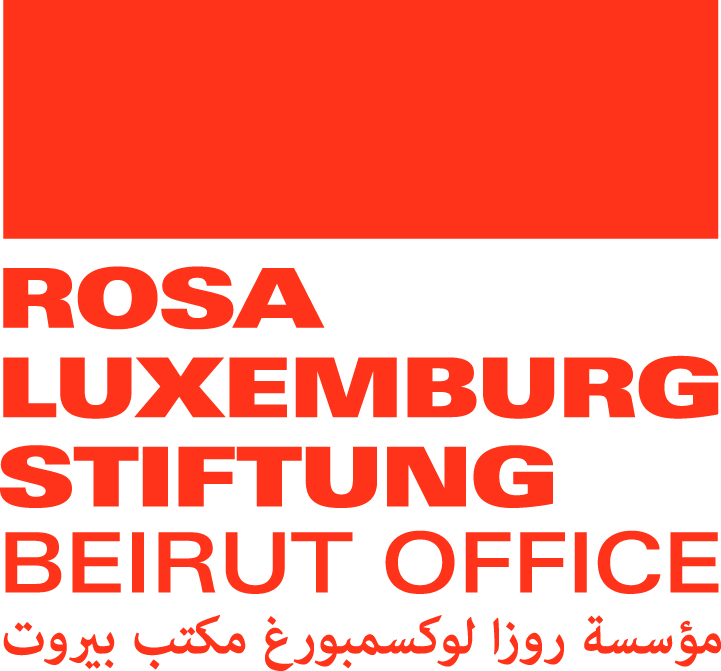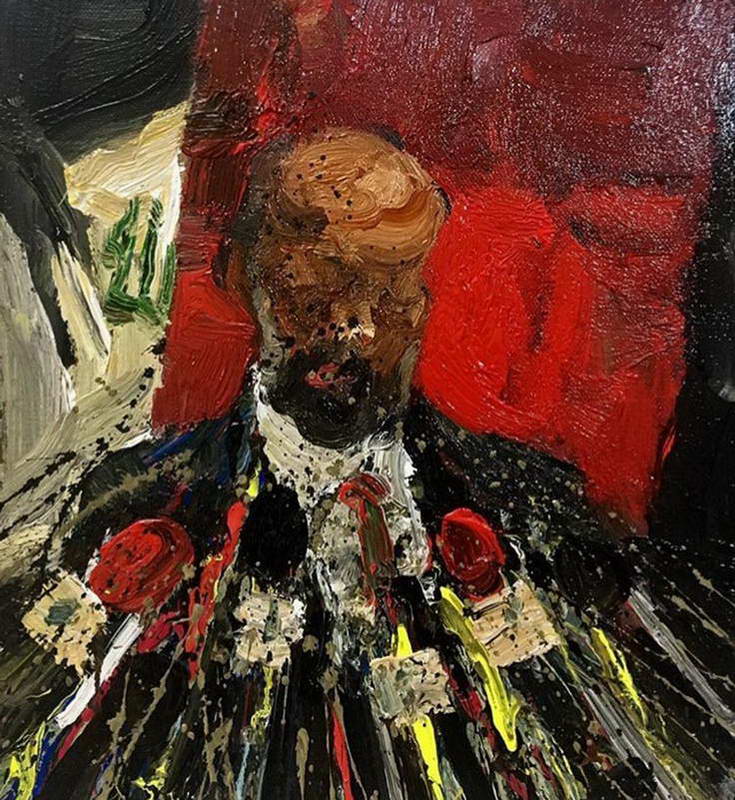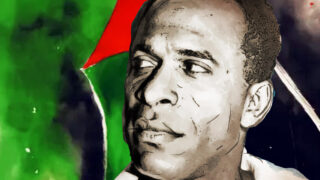
This publication has benefited from the support of the Rosa Luxemburg Foundation. This text may be reproduced in part or in full, provided the source is acknowledged.
The image is unforgettable. On that spring night, massive explosions shuddered a sleeping city. The United States' air force was initiating the first phase of the invasion of Iraq through bombing one of the most iconic capitals of the Arab-Muslim civilization with unprecedented violence. Broadcast live by the CNN and the Qatari channel Al Jazeera, which was widely watched in Algeria, the fiery display immediately brought back memories of the horrific massacre at the Al-Amiriyah shelter in 1991 during the first Gulf War. In the twisted minds of American neoconservative pseudo-strategists, this inferno of violence was meant to elicit “shock and awe” in the bombed population through the use of overwhelming power and spectacular displays of force that supposedly destroy their will to fight and lead to their unconditional submission to imperial supremacy. At that very moment, the international legal order established after World War II was being undone.
From Iraq to Algeria: geographic distance and historical proximity
Algerians were not caught off guard by the aggression which had loudly and repeatedly been announced by the United States and its allies. The political message of this attack, marked by monstrous brutality, was unmistakable. The heavy and indiscriminate bombing of civilians and the destruction of civilian infrastructure with the stated goal of toppling the Baathist regime were an explicit warning to anyone who dared to challenge the US supremacy, especially to the countries of the Rejectionist Front and, through them, to the Arab-Muslim peoples in solidarity with the Palestinian people.
The first line of defense against any external threat lies in the unity of the people and leaders of the country. It is absolutely necessary, in Iraq, as in Algeria and elsewhere in this constantly crisis-ridden Arab world, to achieve political systems which are acceptable to the majority of the populations. This means that regimes must be open to fundamental freedoms and the rule of law.
In Algeria, the trauma lingers twenty years later, and none of the witnesses to this tragic event have forgotten the apocalyptic opening act, founded on brazen lies, of a new chapter of the perpetual Iraqi tragedy. The extensive Western propaganda campaign, based on manipulation and deception, only deceived those who were willing to be deceived: Iraq, which was in no way involved in the 9/11 attacks, did not possess weapons of mass destruction. Like the rest of the Arab public opinion, Algerians closely followed the series of bloody events, the carnage, and the destruction of a country which was the cradle of civilizations.
I Am All of These Dead Faces
01-09-2023
Though geographically distant, Iraq was emotionally close to Algerians. No one in Algeria has forgotten the multifaceted and unwavering support of the Iraqi people for the national liberation struggle, nor has anyone forgotten the reception of Algerian students in Iraqi universities and military academies at the height of the anti-colonial war. In fact, many Iraqis visited Algeria in the early years after independence to provide technical support in various economic and social sectors in Algeria. Some even established roots in Algeria while maintaining ties with their home country. This was facilitated by the fact that the two peoples at opposite ends of the Arab-Muslim crescent shared numerous socio-cultural traits. In truth, behind their apparent rough temperaments, both Iraqis and Algerians concealed genuine generosity.
Algerians and the trajectory of the Iraqi disaster
On the political front, while unwavering solidarity with the Iraqi people was tangible, Algerian public opinion remained critical of Saddam Hussein's regime. The widely shared sentiment was that the brutal Baathist dictatorship bore a heavy responsibility for the tragedy endured by the people of “the land of the two rivers.” These mixed popular sentiments were also shared by the Algerian authorities, who had not forgotten that it was Saddam Hussein himself who, by tearing up the March 1975 Algiers Agreement , had placed his country on a catastrophic trajectory. The historic agreements reached by the Shah of Iran, Reza Pahlavi, and Saddam Hussein, then vice-president of Iraq but the strongman of the regime, under the auspices of President Boumediene , had been recognized by the Iranian regime that took power after the 1979 revolution. Baghdad's abrupt shift, which was justified by the threat posed by the new Iranian Islamic regime, and its new allegiance towards the Gulf monarchies, after having been one of the driving forces behind the Arab opposition to these states’ abandonment of the Palestinian cause, were insidiously encouraged by Western powers, who were more than happy to kill two birds with one stone.
In the twisted minds of American neoconservative pseudo-strategists, this inferno of violence was meant to elicit “shock and awe” in the bombed population and destroy their will to fight, leading to their unconditional submission to imperial supremacy. The international legal order established after World War II was being undone.
The Iraqi tragedy is the tragedy of the entire Arab-Muslim world, from the Gulf to the Atlantic. Two decades after the destruction of its state, Iraq's absence from the international stage is strongly felt Arab societies. This country of immense culture and ancient wisdom, traditionally a defender of just causes in the Middle East, is bound to regain its independence and rise again.
Subsequent historical milestones, starting from the economic collapse to the annexation of Kuwait by Iraq in 1990 with the collapse of the Iraqi army in the face of a coalition led by the US in 1991, and culminating in the US military intervention in 2003, represent a coherent, destructive trajectory triggered by the terrible strategic blunder of waging war against Iran in September 1980.
At each of these stages, Algerian diplomacy tried everything in its power to placate the Western impulse towards a war and encourage Iraqi leaders to exercise restraint by alerting them to the major risks involved. The tireless efforts of President Chadli Bendjedid in the spring of 1990 to find a political solution to Saddam Hussein's Kuwaiti adventure were met with a resounding refusal. Before this, in the midst of the Iraq-Iran war, the ceaseless efforts of Foreign Minister Mohamed-Seddik Benyahia to bring the belligerents to the negotiating table ultimately cost him his life in May 1982.
In 2003, Algeria's voice carried much less weight on the international stage, as the country had been embroiled since the 1990s in a “dirty war” against civilians, which had severely weakened it and tarnished a regime that knows no other recourse than repression. Nevertheless, the Algerians, shocked by the US-British aggression, forced the Algerian leaders to allow solidarity demonstrations outside the capital. President Abdelaziz Bouteflika condemned the invasion of Iraq in relatively measured terms. However, the triumphant reception of French President Jacques Chirac in Algeria in March 2003, following France's eloquent refusal to take part in the invasion, as expressed by Foreign Minister Dominique de Villepin on March 14, evidently expressed the true sentiment of the population.
Gunboat diplomacy: divide and conquer
The imperialist intervention of 2003 in Iraq, without the approval of the United Nations, marked a new era in international relations. Gunboat diplomacy , a means of Western colonial expansion that many believed had disappeared since the waves of independence of colonized settlements and the American defeats in Southeast Asia in the 1960s and 1970s, was regaining its full function and efficacy as an instrument of power.
Since the dissolution of the USSR in 1990, Western states, under US leadership, have never hesitated to resort to war whenever they deemed the strategic circumstances in their favor. This belligerence was evident in the former Yugoslavia in 1999, even before the invasion of Iraq, as well as in Afghanistan in 2001, and was confirmed in Libya in 2011.
The advances of positive international law since the end of World War II were being challenged by the development of ideological arguments such as “humanitarian intervention” and the “duty of assistance,” among other expressions of media and psychological warfare. These elements of communication, presented as a permanent psychodrama, were heavily deployed all over the media to condition Western public opinion. The powerful propaganda justifications, amplified by globalized media apparatus, contribute to stifling critical voices that contest the regression of rights in favor of a logic of power devoid of any morality. This course has been maintained, with minor differences, under the Trump administration. Joe Biden’s administration, however, has been fully committed to the geostrategic perspective established by George W. Bush. As an enthusiastic warmonger and chairman of the Senate Foreign Relations Committee in 2003, Joe Biden distinguished himself with the radicalism of his discourse, oscillating between messianic flights and deceptive arguments, even advocating the partition of Iraq…
For Algeria, the political and security implications of the 2003 war against Iraq were straightforward: “if you want peace, prepare for war.” However, it seems that not all the lessons of this war have been learned. The need for a consensual deterrence policy has not been accompanied by political openness, and the regime continued to practice political repression.
The Iraqi theater has been and continues to be a field of application of neocolonial methods of dividing societies along ethnic and sectarian lines by using socio-political ruptures to weaken all resistance to domination at its roots. One of the essential lessons of the Iraq war lies at the level of the complete destruction of all state structures in Iraq. The modus operandi of imperialism, in direct reference to the “lessons” of colonial anthropology, centers on deepening the antagonisms present in the societies it targets in order to fragment the nation-states that attempt to resist its domination.
This tactic was heavily practiced in Iraq, by pitting Shiite and Sunni Muslims or Kurds and Arabs against each other... The same strategies are activated wherever possible, as observed in Syria, Sudan, or Yemen. In Algeria, neo-colonial agents have been attempting in recent years to create a division between Arabic-speaking and Berber-speaking populations.
In 2023, Iraq is a country under US tutelage, fragmented and severely weakened. The central state, largely stripped of the elements of its sovereignty, no longer represents the strategic depth of the countries on the front lines of the confrontation with Israel. For many, this was indeed the primary objective of the war initiated by Bush and US neoconservatives.
Resistance twenty years later
Beyond psychological warfare, the invasion of Iraq essentially appears to be a culmination of all the criminal practices committed by an occupying army. The American discourse about defending freedom, fighting autocracies, and the “global war on terror,” as George W. Bush put it, could no longer mask the entirely cruel actions that starkly contradict any defense of democracy and peace.
One million deaths, hundreds of thousands of wounded persons and shattered lives, along with countless human rights violations and the overt looting of Iraq's heritage... The US occupation and its military leaders can be blamed for all these atrocities, including the destruction of civilian infrastructure and violating religious symbols. The undignified and perverse media spectacle of Saddam Hussein's execution on November 30, 2006, on the day of Eid al-Adha, revolted even those who had no sympathy for the deposed dictator, but considered the display an insult to Islam.
The overwhelming material superiority of the invader did not, however, diminish the will of Iraqis to live freely in a country free from neocolonial tutelage and the bane of the Green Zone, a true center of imperial decision-making at the heart of Baghdad. In a striking parallel, like Algerians in the past, Iraqis continue to resist and inflict daily damage on the occupying forces.
Though geographically distant, Iraq was emotionally close to Algerians. No one in Algeria has forgotten the multifaceted and unwavering support of the Iraqi people for the national liberation struggle, nor has anyone forgotten the reception of Algerian students in Iraqi universities and military academies at the height of the anti-colonial war.
With its series of unpardonable crimes, the US occupation marked the end of the illusion of democratization imposed by foreign armies. In the Maghreb, and in Algeria in particular, controversies regarding this issue ended with the destruction of Libya in 2011. The widely prevailing sentiment is that the political leaders of the country bear responsibility for this disaster as well. There is a near-consensus that Saddam Hussein's regime's prohibition of any dissident voice deprived Iraqi society of essential debates on the country's fundamental strategic choices. By monopolizing political truth, despotism became the primary cause of a debilitated society, unable to defend itself.
Lessons of the 2003 war
Beyond this common-sense observation, the need to have sufficiently deterrent defense capabilities to discourage any external aggression is evident. This prerequisite is illustrated by the weakness of Iraq's defense capabilities, exhausted by years of war and embargo. The same was true in Libya, which greatly facilitated foreign interventions.
For Algeria, the political and security implications of the 2003 war against Iraq were straightforward: “si vis pacem para bellum” (if you want peace, prepare for war). The modernization and equipping of the Algerian army undertaken after the invasion have continued and fortified with the deterioration of regional security conditions. However, it seems that not all the lessons of this war have been learned. The need for a consensual deterrence policy has not been accompanied by political openness. In terms of political repression, the regime did not budge, and in terms of its foreign relations, the pro-Western policies, which were evident during the corrupt reign of Abdelaziz Bouteflika (1999-2019), have not contributed to the country’s development. From this perspective, the recent rapprochement with China and Russia constitutes a rebalancing of the country's international relations more in line with its tradition of non-alignment.
In a global context characterized by Western determination to maintain hegemony - even if it entailed resorting to war - it is impossible for a country like Algeria to achieve strategic parity with industrialized nations.
A more realistic goal would be to be able to inflict substantial damage on any potential aggressor within a context of an asymmetrical conflict.
The Algerian authorities did not forget that it was Saddam Hussein himself who, by tearing up the March 1975 Algiers Agreement, had placed his country on a catastrophic trajectory. Baghdad's abrupt shift, justified by the threat posed by the new Iranian Islamic regime, and its new allegiance to Gulf monarchies, after having spearheaded the Arab opposition to these states’ abandonment of Palestine, were insidiously encouraged by Western powers.
The rising dangers in the Maghreb, overshadowed by the war in Europe and tensions in the Middle East and the Taiwan Strait, are indeed alarming. The chronic destabilization of the entire region, the crises in Libya and the Sahel openly fueled by extra-continental interference, extend to the western borders of Algeria with the emergence of a particularly hostile actor. Indeed, following the normalization of its relations with the Moroccan monarchy, Israel is developing extensive and multifaceted military cooperation clearly directed against Algeria.
These alarming signals have enhanced awareness of security challenges which have been growing for several years. The adaptation of defense capabilities, which was initiated in 2005 through military agreements with Russia , seems to be confirmed. It appears that the current Algerian leadership has learned the lessons of the 2003 war, as well as of NATO’s aggression on Libya in March 2011.
Multipolarity and sovereignty
On the front of external politics, the lesson that can be drawn from the Iraqi tragedy lies in the need to consolidate solid and effective international alliances. Adherence to the principles of non-alignment is a condition for maintaining a minimum level of autonomous decision for a country like Algeria, which holds a median political weight on the international stage. Above all, the lesson is about not repeating the political mistake made by the Baathist regime. In his eagerness to appear as a trustworthy partner, Saddam Hussein fell for Western promises, and for this mistake, his people continue to pay a heavy price.
It is clear that American unilateralism, which has exacerbated since the late 1990s and now heads the rest of the vassalized Western world, has not contributed to pacifying a divided world. On the contrary, the collapse of the Soviet Union, which further gave way to US hegemony, launched a sequence of brutal destabilizations and unending wars. Western armed interventions in Iraq and elsewhere have brought unprecedented mourning and destruction while fueling extremism. To ensure their protection, prosperity, and security, there is no other option for countries wishing to preserve their decision autonomy than to work towards a less imbalanced world order.
Thus, the necessary democratization of international relations can only be contemplated through the establishment of counterbalances that only multipolarity can guarantee. Initiatives for regional groupings like the Shanghai Cooperation Organization (SCO) or international ones like the BRICS , are positive signals in the path toward the peaceful resolution of disputes between sovereign countries.
The lesson lies in the need to consolidate solid and effective international alliances. Adherence to the principles of non-alignment is a condition for maintaining a minimum level of autonomous decision for a country like Algeria. Above all, the lesson is about not repeating the political mistake made by the Baathist regime.
Nevertheless, the tragic Iraqi experience proves, twenty years after the war, that the first line of defense against any external threat is the unity of the people and leaders of the country. It is absolutely necessary, in Iraq, as in Algeria and elsewhere in this constantly crisis-ridden Arab world, to achieve political systems which are acceptable to the majority of the populations. This means that the regimes of these countries must be open to fundamental freedoms and the rule of law.
The Iraqi tragedy is, in fact, the tragedy of the entire Arab-Muslim world, from the Gulf to the Atlantic. Two decades after the destruction of its state, Iraq's absence from the international stage is strongly felt in the societies of the Arab world. This country of immense culture and ancient wisdom, traditionally a defender of just causes in the Middle East, is bound to regain its independence and rise again. From the Mashreq to the Maghreb, the voice of the dignified people of Iraq will resound once again.
The content of this publication is the sole responsibility of Assafir Al-Arabi and Rosa Luxemburg Foundation cannot accept any liability for it.
Translated from Arabic by Sabah Jalloul
Published in Assafir Al-Arabi on 07/09/2023
The folder “Twenty Years since the War on Iraq” is a joint production between Assafir Al-Arabi and Jummar, with the support of the Rosa Luxemburg Foundation.
1- An agreement between Iran and Iraq to settle any outstanding territorial disputes along the Iran–Iraq border.
2- And his Minister of Foreign Affairs at the time, Abdelaziz Bouteflika, who would later become president of Algeria between 1999 and 2019.
3- https://algeria-watch.org/?p=34450
4- Gunboat diplomacy is a form of hegemony comprising the pursuit of foreign policy objectives by colonial powers, using displays of power or threats of war to terrorize the countries they intend to subjugate. [Translator’s note]
5- https://tinyurl.com/28auseeb
6- https://dppa.un.org/fr/shanghai-cooperation-organization
7- http://french.xinhuanet.com/2016-10/17/c_135760886.htm






